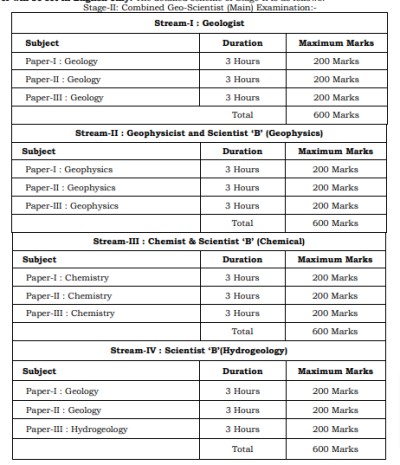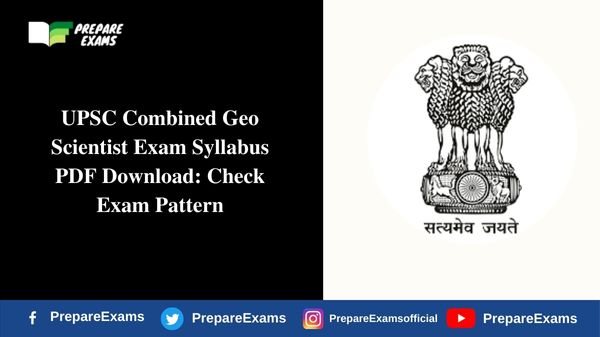UPSC Combined Geo Scientist Syllabus 2022 PDF Download: Check Exam Pattern – In this article, students will find the UPSC Combined Geo Scientist Exam Syllabus PDF direct links, UPSC Combined Geo Scientist Exam Pattern 2022, UPSC Combined Geo Scientist Selection Process, and so on and will get the latest and updated UPSC Combined Geo Scientist Syllabus 2022 along with Exam Pattern.
UPSC Combined Geo Scientist Syllabus 2022 – Overview
| Board Name | Union Public Service Commission (UPSC) |
| Posts | Geologist, Geophysicist, Chemist, Scientist ‘B’ (Hydrogeology), Scientist ‘B’ (Chemical) & Scientist ‘B’ (Geophysics) |
| Category | Syllabus |
| Job Location | India |
| Selection Process | Preliminary Examination, Mains Examination, Interview/ Personality Test |
| Official Website | upsc.gov.in |
UPSC Combined Geo Scientist Exam Pattern 2022
- Stage-I – Combined Geo-Scientist (Preliminary) Examination (Objective Type Papers) for the selection of candidates for the Stage-II – 400 Marks
- Stage-II – Combined Geo-Scientist (Main) Examination (Conventional Type Papers); – 600 Marks
- Stage-III – Personality Test/ Interview – 200 Marks
Stage-I: Combined Geo-Scientist (Preliminary) Examination

Stage-II: Combined Geo-Scientist (Main) Examination

| Also Read: |
| UPSC Combined Geo Scientist Previous Question Papers PDF Download |
| UPSC Combined Geo Scientist Admit Card |
| UPSC Combined Geo Scientist Answer Key |
| UPSC Combined Geo Scientist Results |
| UPSC Combined Geo Scientist Exam |
UPSC Combined Geo Scientist Syllabus 2022
| Download UPSC Combined Geo Scientist Syllabus 2022 & Exam Pattern PDF | Click Here |
Subject Wise – UPSC Combined Geo Scientist Syllabus
Stage-I – (Objective Type)
Paper-I: General Studies (Common for all streams)
- Current events of national and international importance.
- History of India and Indian National Movement.
- Indian and World Geography -Physical, Social, Economic Geography of India and the World.
- Indian Polity and Governance -Constitution, Political System, Panchayati Raj, Public Policy, Rights Issues, etc.
- Economic and Social Development – Sustainable Development, Poverty, Inclusion, Demographics, Social Sector initiatives, etc.
- General issues on Environmental Ecology, Bio-diversity and Climate Change – that do not require subject specialization
- General Science
Paper-II : Geology/ Hydrogeology
- Physical Geology
- Structural Geology
- Mineralogy
- Igneous Petrology
- Metamorphic Petrology
- Sedimentology
- Paleontology
- Stratigraphy
- Economic Geology
- Hydrogeology
Paper-II : Geophysics
- Solid Earth Geophysics
- Mathematical Methods in Geophysics
- Electromagnetism
- Geophysical Prospecting
- Remote Sensing and Thermodynamics
- Nuclear Physics and Radiometry
Paper-II : Chemistry
- Chemical periodicity
- Chemical bonding and structure
- Acids and bases
- Theoretical basis of quantitative inorganic analysis
- Kinetic theory and the gaseous state
- Chemical thermodynamics and chemical equilibrium
- Solutions of non-electrolytes
- Electrochemistry
- Basic organic chemistry
- Stereochemistry
- Types of organic reactions
- Molecular Rearrangements
UPSC Combined Geo-Scientist Mains Exam Syllabus
For the post of Geologist/ Scientist ‘B’ (Hydrogeology)
Stage-II (Descriptive Type)
Geology: Paper-I
- Section A. Physical geology and remote sensing
- Section B. Structural geology
- Section C. Sedimentology
- Section D. Paleontology
- Section E. Stratigraphy
Geology: Paper-II
- Section A. Mineralogy
- Section B. Geochemistry and isotope geology
- Section C. Igneous petrology
- Section D. Metamorphic petrology
- Section E. Geodynamics
Geology: Paper-III
- Section A. Economic geology
- Section B. Indian mineral deposits and mineral economics
- Section C. Mineral exploration
- Section D. Fuel geology and Engineering geology
- Section E. Environmental geology and Natural hazards
Hydrogeology
- Section A. Occurrence and distribution of groundwater
- Section B. Groundwater movement and well hydraulics
- Section C. Water wells and groundwater levels
- Section D. Groundwater exploration
- Section E. Groundwater quality and management
For the post of Geophysicist/ Scientist ‘B’ (Geophysics)
Geophysics: Paper-I
- PART-A
- A1. Solid Earth Geophysics
- A2. Earthquake Seismology
- A3. Mathematical methods in Geophysics
- A4. Geophysical Inversion
- PART-B
- B1. Mathematical Methods of Physics
- B2. Electrodynamics
- B3. Electromagnetic Theory
- B4. Introductory Atmospheric and Space Physics
Geophysics : Paper-II
- PART-A
- A1. Potential Field (Gravity and Magnetic) Methods
- A2. Electrical and Electromagnetic methods
- A3. Seismic Prospecting
- A4. Borehole Geophysics
- PART-B
- B1. Classical Mechanics
- B2. Thermodynamics and Statistical Physics
- B3. Atomic and Molecular Physics and Characterization of materials
- B4. Nuclear and Particle Physics
Geophysics : Paper-III
- PART-A
- A1. Radiometric and Airborne Geophysics
- A2. Marine Geophysics
- A3. Geophysical Signal Processing
- A4. Remote Sensing and Geohydrology
- PART-B
- B1. Solid State Physics and Basic Electronics
- B2. Laser systems
- B3. Digital electronics, Radar systems, Satellite communications
- B4. Quantum Mechanics
For the posts of Chemist/ Scientist ‘B’ (Chemical)
Chemistry : Paper-I (Inorganic Chemistry)
- Inorganic solids
- Chemistry of coordination compounds
- Acid base titrations
- Gravimetric Analysis
- Redox Titrations
- Complexometric titrations
- Organometallic compounds
- Nuclear chemistry
- Chemistry of d- and f-block elements
Chemistry : Paper-II (Physical Chemistry)
- Kinetic theory and the gaseous state
- Solids
- Chemical thermodynamics and chemical equilibrium
- Chemical kinetics and catalysis
- Electrochemistry
- Quantum chemistry
- Basic principles and applications of spectroscopy
- Photochemistry
Chemistry : Paper-III (Analytical and Organic)
- PART-A (Analytical Chemistry)
- A1. Errors in quantitative analysis
- A2. Separation Methods
- A3. Spectroscopic methods of analysis
- A4. Thermal methods of analysis
- A4. Thermal methods of analysis
- A6. Inductively coupled plasma spectroscopy
- A7. Analysis of geological materials
- PART B (Organic chemistry)
- B1. Unstable, uncharged intermediate
- B2. Addition reactions
- B3: Reactions at the carbonyl group
- B4. Oxidation and Reduction
- B5. Electrocyclic Reactions
- B6. Spectroscopic methods of analysis
******** End ********
★★★★ You Can Also Read ★★★★
| Computer Awareness Quiz Questions Set (Banking) |
| Read Daily Current Affairs Topic Wise |
| Daily Current Affairs Quiz (Current GK Test) |
| Static Gk Quiz Questions and Answers |
📣 Prepare Exams is now on Facebook, Twitter, Instagram, YouTube Channel, and Google News to get all the latest News first Like, Follow and bookmark our website @ PrepareExams.com.
For all the latest Updates, download PrepareExams App.


